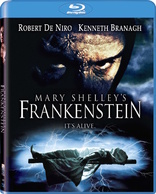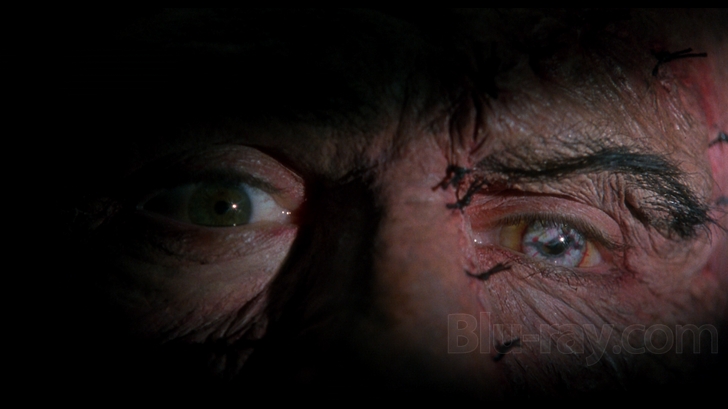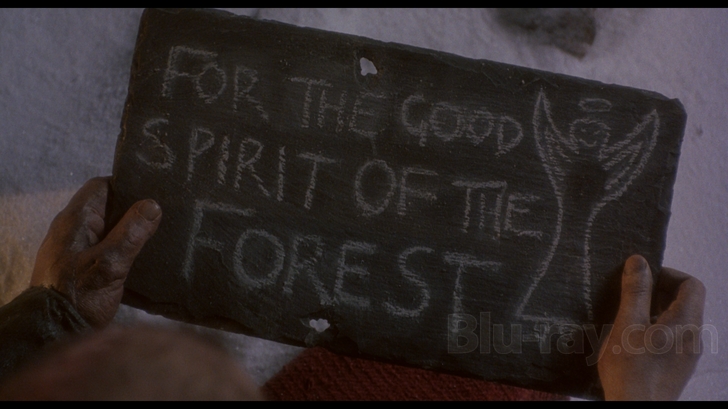Mary Shelley's Frankenstein Blu-ray Movie
HomeMary Shelley's Frankenstein Blu-ray Movie 
Sony Pictures | 1994 | 123 min | Rated R | Oct 06, 2009
Movie rating
6.6 | / 10 |
Blu-ray rating
| Users | 4.1 | |
| Reviewer | 3.5 | |
| Overall | 3.5 |
Overview
Mary Shelley's Frankenstein (1994)
In this epic and romantic new version of the classic film, the creature (Robert De Niro) is driven to revenge when his master rejects him after giving him life.
Starring: Robert De Niro, Kenneth Branagh, Tom Hulce, Helena Bonham Carter, Aidan QuinnDirector: Kenneth Branagh
| Horror | 100% |
| Sci-Fi | Insignificant |
| Drama | Insignificant |
| Romance | Insignificant |
Specifications
Video
Video codec: MPEG-4 AVC
Video resolution: 1080p
Aspect ratio: 1.85:1
Original aspect ratio: 1.85:1
Audio
English: DTS-HD Master Audio 5.1
French: DTS-HD Master Audio 5.1
Portuguese: DTS-HD Master Audio 5.1
Subtitles
English, English SDH, French, Portuguese, Spanish, Indonesian, Korean, Mandarin (Simplified), Mandarin (Traditional), Thai
Discs
50GB Blu-ray Disc
Single disc (1 BD)
BD-Live
Playback
Region free
Review
Rating summary
| Movie | 4.5 | |
| Video | 4.0 | |
| Audio | 3.5 | |
| Extras | 0.0 | |
| Overall | 3.5 |
Mary Shelley's Frankenstein Blu-ray Movie Review
A filmed adaptation of a classic tale comes to Blu-ray without bonus features.
Reviewed by Martin Liebman October 7, 2009No one need ever die.
The tale of Victor Frankenstein and his pursuit to create life from death represents one of the
great
tragedies of modern storytelling. It's a tragedy of life and death, of heart and soul, and of the
very
essence of man. It's of giving and taking away, creating and destroying, of gaining knowledge at
the expense of the soul. It's a tale of the human condition, of acceptance and rejection, of
perception and personification. Frankenstein's creation is both at once a sympathetic figure and a
beast to be reckoned with. He's not only of many physical parts but of two souls, a creature
struggling to find his place as a man in a world that rejects his very existence simply because of
his horrific
physical appearance. The creature's pursuit of both worldly knowledge and spiritual development
further broadens the schism between his ragged body and torn soul; with every step, every
learned
word, every bite of food, and every good action comes eventually an equally devastating reaction
that only reinforces his perception of the world as a place unsuitable for him, even though he
may
have plenty to offer not only to the scientific community but as a man with a thirst for knowledge
and a quest for the truth.

LIVE!
The brilliant Victor Frankenstein (Kenneth Branagh, Valkyrie) is moving to Ingolstadt, Germany in order to further his medical studies and learn to harness the power of electricity in hopes of re-animating dead tissue. Leaving his step sister and love interest Elizabeth (Helena Bonham Carter, Terminator Salvation) behind in Switzerland, Victor arrives in a city that's in the midst of a deadly plague. There, he meets a fellow medical student by the name of Henry (Tom Hulce, Amadeus) and the brilliant Professor Waldman (John Cleese) who shares in Victor's passion for re-animating the dead. When Victor learns Waldman's secrets, he combines his knowledge with the professors and cobbles together an abomination comprised of the body parts of hanged criminals, those that died of plague, and the brain of one of the city's most prominent and recently-deceased thinkers. Frankenstein's experiment is a success; he brings to life a beast that sets out to discover the world -- and his place in it -- but finds only hardship and agony for which he comes to blame his creator.
In part, Mary Shelley's Frankenstein looks at the dangers of overzealous ambition. On the other hand, it examines the human condition more thoroughly and through the eyes of two men, one that sees the world for what he wants it to be, the other for how it truly is. Frankenstein's obsession with his work overruns his life; he becomes a disheveled shell of his former self, a man that has lost touch with not only the physical world around him but the moral and spiritual implications his work may very well -- and ultimately does -- bring to light. The world he tries to better through science crumbles around him, tearing apart lives both his own and of those he loves. On the other hand, Frankenstein's creation sets out in search of himself but finds only rejection, hurt, and hatred. The film's second act is its best, and it serves as the driving point that solidifies the themes of the film and sets up its shocking conclusion. The beast hides in an animal shelter but returns the favor by helping the country family that lives in the adjacent home by gathering their food from the frozen terrain. Though he hides in the shadows, he finds comfort in watching the family reap the benefits of his assistance, and he takes the opportunity to try and better himself by learning to read. The family's patriarch -- a blind old man -- comes to realize that there is someone living nearby; he sees not the beast's physical deformities but instead his gentle soul, judging him not on his looks but rather his deeds. This blind man represents the film's most crucial character. He can only perceive what he feels and understands; he judges the soul and not the body, and finds in the beast a man trying only to better himself and find his place in a world that absolutely rejects him for all the wrong reasons. That's the essence of Frankenstein, a tragic comment on how the world sees man and how man, in turn, sees the world. It's an unbroken chain of distrust and despair, and even in man's attempt to better the world, he only further reinforces its own sad state of affairs.
Mary Shelley's Frankenstein's visual style hearkens back to the classic Horror pictures of old, and the film does well to implement more modern filmmaking techniques but retain the look and feel of an older production that suits the themes of the film wonderfully. Chief among the updates is the wonderfully realized creature makeup for which Daniel Parker, Paul Engelen, and Carol Hemming earned an Oscar nomination. Otherwise, Mary Shelley's Frankenstein retains a classic, no-nonsense look and feel that relies on the strength of its performers and the richness and meaning of its story to enthrall audiences; the film's lavish but worn set pieces and costumes impress but serve only to lend to the film a specific tone that reinforces the themes of physical and spiritual death found in the movie. Not surprising, the film's classic sensibilities are a reflection of its director; Shakespearean actor Kenneth Branagh, who also plays the film's title role, delivers performances on either side of the camera that sometimes feel as mirror images of one another, while at other times they seem as complete opposites. Victor Frankenstein is a man that is confident, forceful, and without compromise. As a director, Branagh's work is sure-handed, steady, and strong. However, as Frankenstein's character evolves and loses touch with reality -- culminating with the most dastardly deed imaginable -- the direction retains the simple yet powerful visual style that always seems to reinforce the themes of both the story as a whole and each individual segment, whether saccharine and moving or painful and tragic.
As Frankenstein's beastly creation, Robert De Niro delivers an inspired performance. He's easy to spot even under the makeup, but the mannerisms, speech patterns, and the way the character carries himself all demand an immersive and extraordinary performance, and De Niro's effort is the equal of Branagh's. The two portray radically different characters with vastly differing ways of carrying themselves, Frankenstein the energetic, clean-cut, intelligent, fit, and classically educated man and the beast a sloth-like, slow to learn, but perceptive creature with a not necessarily stronger moral compass but certainly one's that more cut-and-dry in how it perceives the world. Nevertheless, each shares in common a search for their place in the world. Both work towards the goal of self-discovery, but from different stages in life; Frankenstein from a more scientific perspective and in search of bettering not only himself but all of mankind, and the beast seeks to learn exactly who and what he is and why he exists on a more base level.
Mary Shelley's Frankenstein Blu-ray Movie, Video Quality 

Mary Shelley's Frankenstein debuts on Blu-ray with a strong 1080p, 1.85:1-framed transfer. The image retains a film-like look and a somewhat subtle layer of natural film grain. This transfer isn't the sort to dazzle the visual senses; Mary Shelley's Frankenstein is a drab, lifeless movie, particularly in its Germany segments; it takes on a bland color scheme that's made up of shades of gray, reflecting not only the dismal living conditions and the plague that has stricken the city, but the film's very essence as an examination of the human condition. Though fine detail suffers as a result, the transfer renders what there is to see well enough. The brick-laden streets and the stone façades of Ingolstadt don't reveal much texture, but the soft shooting style and dim palette are the culprits, not Sony's transfer. There are a some splashes of bold colors, particularly in the film's Geneva sequences, and while there is little blood in the film, its red color tends to stand out from the rest of the image. Black levels are solid, and flesh tones retain a neutral shade, though faces are devoid of finer details. Mary Shelley's Frankenstein certainly isn't the stuff of 1080p bliss; nevertheless, the transfer does an admirable job of replicating the director's intended vision nicely, and by extension, this makes for another high-class catalogue release from Sony.
Mary Shelley's Frankenstein Blu-ray Movie, Audio Quality 

This Blu-ray release of Mary Shelley's Frankenstein features a subtle but clear and well-balanced DTS-HD MA 5.1 lossless soundtrack. This mix is decidedly reserved and, frankly, not at all aurally stimulating, but it gets the job done. The severe storm at sea as heard at the beginning of the film delivers a full, satisfying, room-filling attack. The surrounds are fully realized, and the listener is completely engulfed in the chaos. In a subsequent scene, a chilling breeze blows throughout the listening area to realistic effect. Once the action switches to Geneva and Germany, there's little sonic activity of note. Music and dialogue are rendered crisply and cleanly; the score sometimes seeps into the back channels, as does the occasional sound effect, and dialogue and footsteps reverberate nicely throughout the cavernous Frankenstein home in Geneva. Several claps of thunder deliver steady, and sometimes prodigious, blows of power through the soundstage. Otherwise, this one is about as standard as they come; it's by no means a bad or disappointing listen, but the track -- by design -- simply offers but a few moments that allow the lossless encode to stretch its legs.
Mary Shelley's Frankenstein Blu-ray Movie, Special Features and Extras 

This Blu-ray release of Mary Shelley's Frankenstein features only BD-Live functionality and 1080p trailers for Close Encounters of the Third Kind, The Da Vinci Code, Ghostbusters, and Men in Black.
Mary Shelley's Frankenstein Blu-ray Movie, Overall Score and Recommendation 

Indeed, this tale captures the very essence of tragedy; it's the story of two men, both in search of their place in the world and meaning in their lives, and their pursuit only reinforces the grim reality from which they seek to break free. Mary Shelley's Frankenstein is the quintessential filmed adaptation of this classic story. Featuring two standout performances from Kenneth Branagh and Robert De Niro, Oscar-nomianted make-up, lavish if not deliberately dreary set and costume design, and an unflinching dramatic examination of the human condition from two radically different perspectives but of the same quest to find meaning and a place in the world, the film succeeds on every level. Sony's Blu-ray release does the film's technical merits justice. Featuring another quality film-like transfer from Sony and a good lossless soundtrack, the disc's sole downfall lies in its omission of film-related bonus materials. Nevertheless, Mary Shelley's Frankenstein comes recommended based on the strength of the film.
Other editions
Mary Shelley's Frankenstein: Other Editions

Mary Shelley's Frankenstein 4K
1994

Mary Shelley's Frankenstein 4K
1994

Mary Shelley's Frankenstein 4K
1994

Mary Shelley's Frankenstein
1994
Similar titles
Similar titles you might also like

Son of Frankenstein
1939

Frankenstein Must Be Destroyed
1969

The Invisible Man 4K
1933

Dracula
1979

The Evil of Frankenstein
Collector's Edition
1964

The Revenge of Frankenstein
1958

Frankenstein Created Woman
Collector's Edition
1967

Return of the Fly
1959

Kiss of the Damned
2012

Dracula
Includes "Drácula"
1931

The Wolf Man
1941

Island of Lost Souls
1932

Victor Frankenstein
2015

The Last Voyage of the Demeter
Collector's Edition
2023

Tales of Halloween
2015

King Kong
Warner Archive Collection
1933

The Creature Walks Among Us
1956

Revenge of the Creature 3D
1955

The Incredible Melting Man 4K
Slipcover in Original Pressing
1977

It Came from Outer Space 4K + 3D
1953